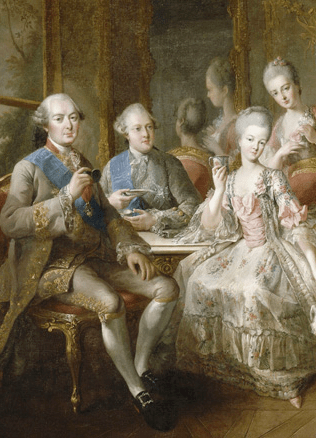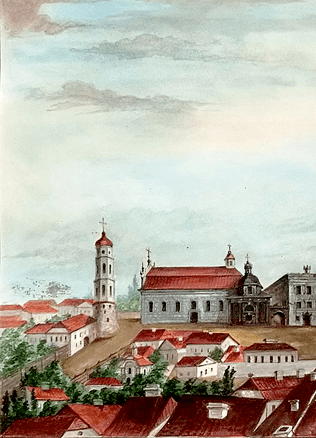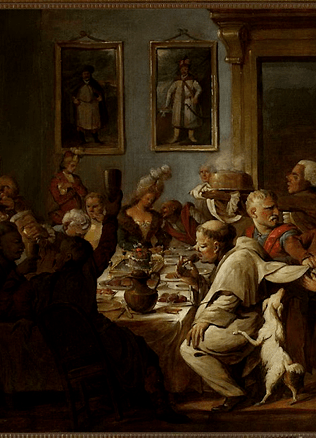The Story of the Chamber Pot
In his colourful memoirs A Few Years of My Youth in Vilnius, Stanisław Morawski (1802-1853) attributes a particular incident to Vilnius Bishop Ignacy Jakub Massalski (1726-1794), which was one of his funniest anecdotes in the salons of Vilnius in the 19th century. According to him, the Vilnius bishop was often linked to this event, and that “was a counterbalance to the vainglory of his rival Duke Radziwiłł “Panie Kochanku.” The Voivode of Vilnius duke Karol Stanisław Radziwiłł, who always told thousands of similar untrue anecdotes about himself.”
Soup in a chamber pot
Masalskis’ story begins, as befits a noble, with hunting. While hunting, “chasing a deer (or perhaps a rabbit) in the dense forest full of windfall he became and, having become separated from his entourage, he had no other choice but to trust his fate and go where he legs would take him, and go along the narrow path that did not arouse much hope.” Having gone along this path, the Vilnius bishop reached an unknown “outer wall, where the new and orderly buildings bore witness to good hosts. There lived a wealthy peasant, he had established his abode here, at the edge of the forest. The bishop was tired and could barely move his legs; he needed to rest and gain strength. The man took him in hospitably, as every traveller, not even guessing who was visiting him.” The bishop gave him a thaler and asked that the peasant’s wife kill a chicken and make grain barley soup. Overjoyed with such a generous guest, the peasants went to work to carry out his wish, while the bishop laid down on the hay to rest. Suddenly they awoke him and declared that dinner was ready, took him to the farmstead where there was a table covered with a fresh tablecloth, and a spoon, knife and fork set. Praising the neatness, the bishop sat at the table “and the peasant, with triumph (his facial expression, seemed to say “Wait, Father, you have yet to see this.”) puts the grain porridge on the table in front of him, but, how do you think, what was it poured in? A clay bowl? No! A tin one? No! Well, it appears that it was in a white porcelain chamber pot!
Creative versions of the chamber pot anecdote in the salons of European aristocrats
At the end of the anecdote, it is explained to the listeners that the “honourable peasant, wanting to have a at least one non-clay object at home, something luxurious, that he could occasionally be proud when guests come not only in his wealth, but in his dishware. Once when he went to Vilnius, he saw various kinds of porcelain items in the display window of a shop and decided to buy a vase for soup. He looked and looked, but no style suited his tastes, except for the chamber pot. Then he bought it, thinking that it is a vase for soup.”
The anecdote of Vilnius Bishop Massalski makes fun of the peasant’s ignorance and lack of education, however this story is not the only one of its kind. A similar incident was talked about in the salons of Warsaw, just the main character of it was not the Vilnius bishop, but King of Poland and Grand Duke of Lithuania Stanisław August Poniatowski, who was able to successfully escape in 1771 from the Bar Confederates that had captured him. Just like Massalski, he found himself in the forest, got lost, and became tired. He found refuge in the hut of a peasant, where he slept, and in the morning received breakfast, also in a chamber pot. Later Henryk Sienkiewicz included a reworked version of it in his novel With Fire and Sword (1883-1884). It is said that in the middle of the 17th century Cossacks, who had taken over a Polish army camp, drank wine from Hetman Potocki’s chamber pot without suspecting a thing.
It is unlikely that we will find out the origins and author of this story, but it is thought that it spread in the salons of aristocrats during the Enlightenment (which shows the social accentuation of this story.).
What’s important here is that the “wealthy peasant” was the one that garnered ridicule, and not a city dweller. In the second half of the 18th century, discussions grew concerning the bettering of the peasants’ lot, the ending of serfdom, and spread of education. One version that can’t be thrown out is that Masalskis, who travelled much through Europe, may have heard this story while travelling and adapted it to the conditions of Lithuania.
K. S. Radziwiłł’s stories remind those of Münchhausen’s own
Concerning Masalskis’ greatest rival, as K. S. Radziwiłł is described by Morawski, the stories spread, and gradually became anecdotes. The life and customs of this man beloved by the majority of nobles were far from the ideals of the Enlightenment, which is why they garnered the criticism of educated people. In his memoirs, Salomon Maimon (1753-1800), who did not avoid sarcasm, described the luxurious trip of Vilnius voivode Duke K. S. Radziwiłł together with his entourage that included numerous courtiers, nobles, servants and his own army. Supposedly the duke unexpected found himself in the house of Maimon. The teller of the story says in an ironic manner: “In evening High Highness the Duke (I cannot say who – an honourable person, because the Hungarian wine dulled his senses, which is the foundation of a person) came to my tavern in the town of K, which belonged to the residence of his highness, at the end of the outskirts of N. The duke was brought into the house with his clothes and spur boots on and thrown on the muddy, uncovered bed of my mother-in-law (…)
The next morning the duke was woken up early. He looked around and did not know whether or not to believe his eyes: he was laying down still dressed in a cheap tavern on a muddy bed teeming with bugs.
(…) The duke wanted to celebrate a grand dinner feast in the tavern I owned. All the nobles of foreign countries were invited, all that were visiting the city at the time. (…) In the cheap tavern, the walls of which were simply black from the smoke and soot, while the beams were supported with pillars of an unimaginable form from tree stumps, the windows were poorly fitted together from narrow, old frames of resinous pine, covered with paper; in such a house on muddy benches at an even dirtier table, glowing with luxury, the dukes sat, ordering the most exquisite of dishes and the best wines, ordering them to bring them in golden vessels and goblets.”
Radziwiłł garnered the attention of a host of writers and historians.
He would tell his anecdotes, the meaning of which would be made up of untrue and absurd events. His contemporaries maintain that Radziwiłł would explain to those in attendance that if you wanted to go from Paris to Lithuania you had to cross seas and oceans on the other side of the world, and would share his learning experience of war with Turkey that he never participated in.
Radziwiłł spent a considerable part of his life in Europe, and his stories remind one of the stories of Baron Münchausen. Guests that wanted to win the duke’s favour would listen to the anecdotes, though there were those that did not interest them. When Radziwiłł asked one noble to confirm that in the war with Turkey it was he, the duke, who was able to snatch victory from Turkey, destroying six cannons of the enemies, though his horse had been cut in two, the guest shot back at the duke, saying “Sir, what do you mean, by then I was already dead.”
Literature: S. Moravskis, Keleri mano jaunystės metai Vilniuje, iš lenkų k. vertė R. Griškaitė, eil. tekstus vertė R. Koženiauskienė, Vilnius, 1994, p. 378–379.
Liudas Glemža



